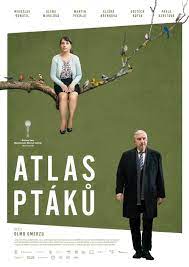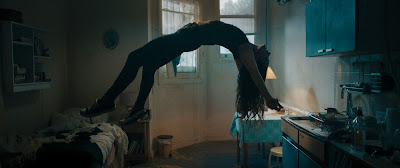Film Notes part 3: drama & thrillers
Aside from ‘Casino Royale’ – which I love and consider one of the best in action he-man cinema – and earlier instalments, James Bond doesn’t do so much for me, but it seemed fully appropriate to complete Daniel Craig’s Bond arc in ‘No Time to Die’ with the finale explosion. I thought Craig was good, but the urge to give backstory and introduce children seemed an unnecessary and a bad fit for this particular action-fantasy.
A film like Teodora Mihai’s ‘La Civil’ was
the kind of drama that shows up fantasy-action films for lacking the social
consequences the crime scenarios riff on.
Jonas Govaerts’s ‘H4Z4RD’ came from the more
lowlife end of crime fiction. Filmed totally from within a car, this is a fun
and furious thriller that is perhaps ultimately not a quite as goofy as
expected from the first half. One of those “One Bad Day” plots where the bad
luck just piles on for our petty-crime adjacent protagonist. He and his car
must take punishment upon humiliation until he learns his lesson (well, we can
assume he does).
The formal fun and pounding soundtrack and some off-colour gags make this entertaining, a memorable entry in the lowlife farce sub genre.
In David Victori’s ‘Cross the Line’, mild-Mannered
people-pleaser Dani (Mario Casas) has devoted his recent life to caring for his
father, but now it’s time to move on and start anew. And he’s on the verge when
he crosses paths with the kind of domineering good time girl that you know is
going to be trouble. The film makes exceptional use of music as it goes from
dad’s unremarkable dying room to neon nightmare as Dani finds that straying
from his caution only gets him deeper and deeper into trouble and desperation.
Victori is obviously going for something more poignant
here with the title (online translator says the original Spanish translate as
“You will not Kill”?), but the fun is following how things, pretty
realistically, spiral out of control, forcing increasingly desperate and
extreme reactions. Like ‘Victoria’, there’s a sense of playing out in
real-time across the city, the handheld camera staying close to the
protagonist– in this case, across Barcelona. It won’t win any friends with
portraying the threat as a wild side female, in film noir style or a nineties
“yuppie peril” scenario, but Smit’s performance is compelling. However, it’s
Casas’ portrayal of a man being altered for life by one night, the toll taken
showing increasingly on his face, that really grounds the film. Perhaps the
film ultimately overreaches for sadness rather than closure, but it’s a vivid
and entertaining thriller with lots of panache.
Adam Mackay’s ‘Don’t Look Up’ had a
pedigree cast and a satirical bent that was sharp enough to upset the right people
with a certain criticism of the mainstream media’s shallowness and callousness.
Perhaps I thought its targets were too obvious, but it captured a certain zeitgeist
with its focus on the venality and egos of politicians and media and the narcissism
of a tech-bro scuppering the survival of humanity. Applying a typically
American Mainstream bright-and-breezy gloss and a little sophistication to politics
– ref: ‘The Big Short’ – certainly helped reached a wide enough audience
to outrage.
Joachim Trier’s ‘The Worst Person in the World’ was
peppered with memorable moments (the flirtation at the party being a personal
favourite), this is a superior character study of fickleness and the roaming
intentions and disappointments that come with aging. Indecision about who you
are and where you are going lingering long after you’ve grown up is a theme not
widely pursued aside from the dominance of the Man Child in mainstream
entertainment, so it’s nice to see it dealt with such a mature eye here.
Ryûsuke Hamaguchi’s ‘Drive My Car’ suffered
from taking a little overlong to reach its destination. The journey was
beautiful, understated and immaculately crafted, but coming to the last act you
may wonder if it will actually arrive anywhere. But it does, so all the beguiling
incidentals aren’t left hanging. It’s a mature film about the lingering and open-endedness
of grief and life, and knowing its destination, a second watch will no doubt be
an even more fulfilling journey.
Speaking of upsetting chillers: Justin Kurzel’s ‘Nitram’
scored high in its deceptively mater-of-fact rendering of the infamous Australian
mass shooting. Between this and "Snowtown", Justin Kurzel proves
again a master of the upsetting and grim, in capturing with empathy and a
relentlessly clear eye on pending national trauma. With stunning performances
by Caleb Landry Jones and Judie Davis, this again shows Kurzel's adeptness in
fleshing out characters that commit monstrous atrocities with empathy but not
endorsement (including ‘The True History of the Kelly Gang’).
In this portrayal of "Nitram" and the
build-up to the 1996 Port Arthur massacre, the frightening observation is of
someone that has no sense of the consequences of his actions, and of how
dangerous he is. Although one can sympathise with his ineptitude with social
skills and subsequent loneliness, this lack of self-awareness is terrifying. Although
not quite as relentlessly bleak as ‘Snowtown’, and on top of its anti-gun
polemic, the focus on issues of how to assimilate someone with problematic behaviour
and mental health issues was uncomfortably central.
Philip Barantini’s ‘Boiling Point’ delivered
one of the best portrayals of working life on screen, focusing on a single
night’s shift in a restaurant. It’s focus on the overlap of detail, on the
interplay of mini-dramas hardly aware of one another, struck a recognisable
truth to anyone familiar with a busy workplace. For this, it deployed a single take to capture
how drama and conflict unfolds in real time, giving this aesthetic a purpose that
surpassed its gimmick status (and I am a sucker for the choreography of the
one-take).
Alternatively, on the less neo-realistic side, there was Mark Mylod's 'The Menu'. Although you will go in knowing the nature of the beast, there's enough unpredictability to keep you at the table and the sprinkling of social commentary adds a little substance. Mostly, it's an enjoyable enough Mad Chef tale.
Olmo Omerzu’s ‘Bird Atlas’ provided a droll
family drama focused on a ruthless, selfish patriarch of a technology company.
He is an irredeemable aging bully and, when taken seriously ill, one son seems
to be making his move, the other is a quiet enabler, and the daughter is
preoccupied with a new baby. The trouble starts when company millions go
missing. Yes yes, a ‘Succession’ scenario, but less gaudy and acerbic
and the characters aren’t wholly obnoxious. In fact, there’s a straightforward
approach to mundane glass and vanilla set design that is akin to the drabness
of soap operas. But there is a bright trip to a snowbound apartment, and one
fantastic shot of a blue train going through a snow-white mountain route.
There’s weight when the unappealing Ivo – a stony Miroslav
Donutil – momentarily turns into an unlikely anti-hero detective to pursue the
mystery and money. Just when it verges on being too dry for its own good, to
almost tedium tedium, there’s a touch of the fantastical when birds, via
subtitles, start to give philosophical and business observations. And it’s a
tale where no one gets what they want and one man’s loveless attitude leaves a
trail of unhappiness. A moderate drama that occasionally hits real heights but
might be an underachiever. But the Greek Chorus of birds is inspired.
Ben Parker’s ‘Burial’ was perhaps minor,
but a decent World War II that I expected to be a vampire flick, maybe, for a
moment, but isn't. Rather, it's a solid wartime drama set in a horror landscape
- coffin, woods, shadow-monster and isolated taverns. The tone is suitably
austere but not drab and desperate, the performances good, the action decent
too if occasionally lost in the shadows.
But for the real wartime deal, there was Edward berger’s
‘All Quiet on the Western Front’. A German adaptation of
Erich Maria Remarque’s phenomenal novel which whilst marking key moments
deviates from the source is truer in spirit rather than detail. It is a truism
that war films are often remarkable and thrilling in spectacle, admirable and
awe-inspiring in technical achievement even as they depict the very worst human
kind has to offer (‘Come and See’ is as beautiful as it is traumatic,
for example), and this ‘All Quiet on the Western front’ is no different.
Its depiction of the trenches and the use of stunning
aerial shots, for example, are cinematically transcendent even as they glide
into the mud and corpses of the trenches and No Man’s land. It stays on the
front and forfeits the tale of soldiers returning home and being dissatisfied,
of no longer fitting in, so the final image of Paul finally finding peace is somewhat
lessened. This is replaced with a focus on the subplot of the politics, of men
trying to stop the war and of arrogant, warmongering higher-ups sacrificing
young men for their own ego and jingoism, a theme true to the novel. However,
Paul’s final intimate scuffle that pauses when both soldiers realise that they are
really just the same in their fatigue and horror, which is at odds with the
faceless slaughter on the battlefield, strikes a resonant chord.
Rightfully horrifying, pretty and brutal, nicely
performed and often stunningly filmed, an outstanding achievement.
For something joyful, if troubled: Panah Panahi’s ‘Hit
the Road’ is set against rugged Iranian terrain and powered by the
non-stop energy of child actor Rayan Sarlak, this slightly mysterious family
road movie seems minor and intimate but reaches deep. Superficially jubilant
and bright, but there’s desperation and persecution beneath. Nevertheless, the
family never the let the peril get in the way of family squabbles and age-old
grievances, so there’s almost a farcical edge. It’s bright, fizzing with
interplay and detail (starts with the kid drawing a keyboard on a leg cast),
amusing (the encounter with the cyclist is a highlight) and not adverse to a
little musical interlude to reach even further, achieving something
bittersweet.
And Martin McDonagh’s ‘The Banshees of Inisherin’
was his most satisfying since his debut. Maybe verging a little ‘Father Ted’
at times, but mostly this is a picturesque exploration of the heartbreak
that can enter male friendships and how those feelings manifest as bafflement,
bitterness, resentment and violence. Oh, and self-destruction. The women know
to get out when they can. Fine performances (is there no end to Barry Keoghan’s
utterly mesmerising disturbing-disturbed-sympathetic oddballs?), sparse
aesthetic, funny and increasingly dark and weighty.

































